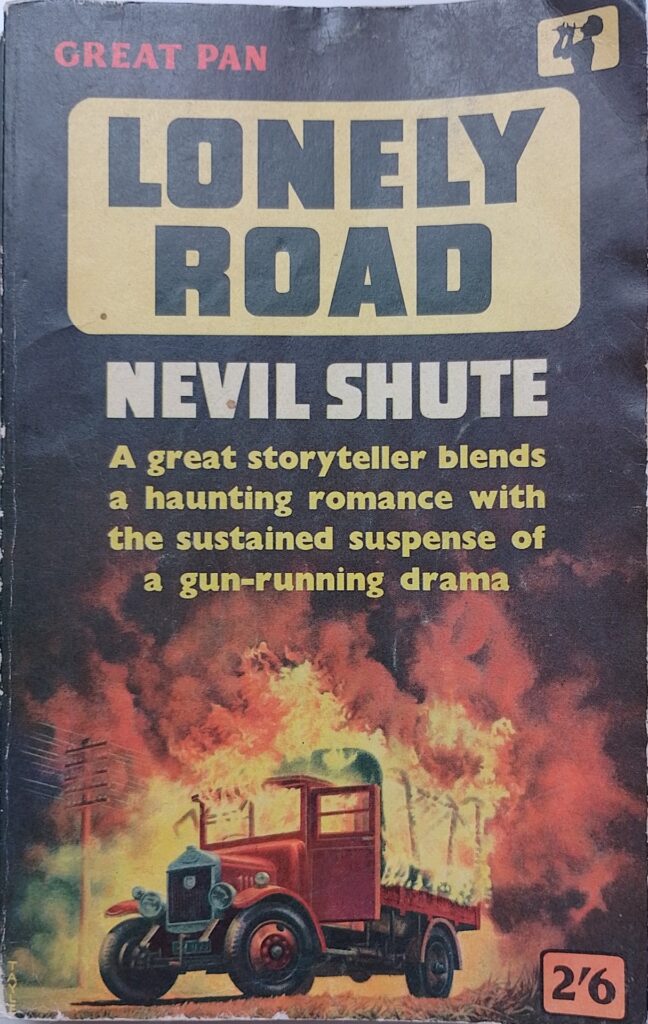First published 1932. Pan paperback, 1962, pp 221, c.92,000 words.
This was Shute’s third published novel, and it marks something of a transition in adventure and thriller writing between the world of John Buchan’s Thirty-Nine Steps and the more realistic post-WW2 everyman heroes of writers like Hammond Innes. It is also has something of an experimental style in the way in which it is written. It purports to be a found work, discovered amongst the papers of a man who has recently died. This idea has been extensively worked up in MacDonald Frasier’s Flashman Papers. Although there is nothing Flash about the hero here, Commander Malcolm Stevenson, who is much more Buchan, in being a wealthy upper-middle-class man with time on his hands and a sense of guilt after WW1. Also unlike Flash, Stevenson is no ladies’ man.
After a preface explaining the origins of the work and a brief summary of Stevenson’s life, the story begins as a series of vignettes – flashes of memory – of a man recovering from a car accident. In an author’s note, Shute laments that some readers failed to get past this, and one can see why it might be hard if one was looking for a straight-forward thrilling yarn. By Chapter 2, the writing settles down to a more linear structure. It becomes clear that Stevenson is a rich but repressed and lonely man. He owns a small shipping business that uses sailing vessels for the coastal cargo trade; outdated even by then. He deeply loves his ships and the sea, but very little else.
Having convalesced with a cousin in Scotland, Stevenson returns south, stopping overnight in Leeds. With nothing to do he goes out in the evening to a Palais where he can hire a partner for sixpence a dance. So begins a very unlikely relationship. To a degree this is a book about class, a dominant characteristic of British society at the time. The good people here, such as a cousin and a solicitor, can overlook the barriers and see the worth in someone from another class. Others have more rigid, or more realistic, views. Families can be brutal.
Some elements are pure Buchan: rich chap, bored with life, gets suddenly drawn into a great conspiracy to overthrow the government. There are a few too many coincidences that land Stevenson in the centre of the plot to be plausible, but once there the doubts and moral ambiguities are well explored. There is a particularly nicely done passage regarding how namby-pamby liberals are hampering the work of the police, but then decent chaps also worry about heavy-handed police possibly giving a ‘girl’ the third-degree. There is a shoot-up that appears pointless from the perpetrators point of view but vital in driving the plot.
Ships and the sea are wonderfully evoked. There is considerable use of sailing jargon, but we are not required to know exactly what those words mean, but just to understand how steeped in it this man is. Shute conveys that world as well as he does aircraft and flight.
The moral ambiguity extends from action in war – and the questionable decisions made when under extreme pressure – to actions taken in revenge under the cover of preventing some greater evil. Shute is very good on the confusion of human emotions, morality and actions. The book also contains a passage that is one of the best presented cases for the introduction of drunk-driving laws.
There is considerable complexity in the plot, even if cracks show in places, as there is in the social relations. The central romance has an unlikely plausibility to it, and as Stevenson falls for the girl, his view of her evolves, eventually recognising her as ‘very beautiful’ [p114].
The book’s depiction of class and how the time between the wars was one of change are well drawn. Towards the end, Stevenson says: ‘I am a sojourner… as all my fathers were.’ [p204], and isn’t that true of all of us? We bide our time, rarely settle, and then are gone. The moral ambiguity in Stevenson’s actions persist throughout.
This story may have its flaws, but it does provide good entertainment, as well as being of particular interest to fans of Shute’s later work. It’s a transition piece in so many ways.
Wikipedia biography of Shute: https://en.wikipedia.org/wiki/Nevil_Shute
Wikipedia summary of the book: https://en.wikipedia.org/wiki/Lonely_Road_(novel)
Others’ reviews of the book: https://www.goodreads.com/book/show/107324.Lonely_Road?ref=nav_sb_ss_2_11
© William John Graham, September 2023

